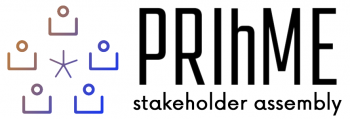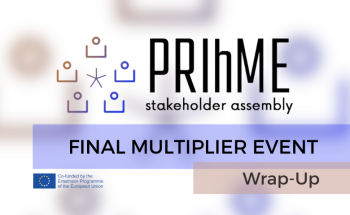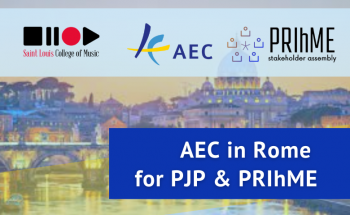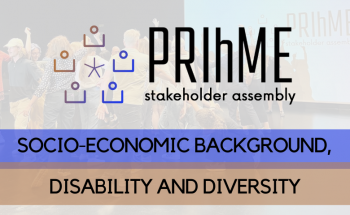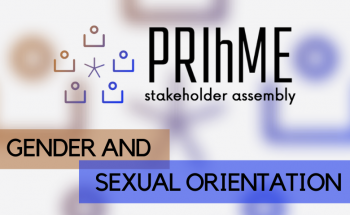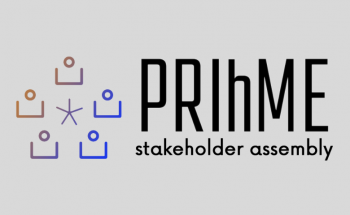The Stakeholder Assembly: Description and Principles
The 50-person PRIhME Stakeholder Assembly included students, teachers, and administrative personnel from 9 European partner institutions. Special attention was given to institutional roles, geographic spread, social and cultural backgrounds, expertise in social inclusion, and civic engagement.
The stakeholder assembly was inspired by the citizen’s assembly model and deliberative democracy, in which a small but diverse and representative sample of people affected by a theme makes inclusive recommendations and conclusions for a larger group.
In PRIhME, the stakeholders used their work and meetings to make policy recommendations to the European Higher Music Education community, thereby providing a framework within which to address power relations. Conclusions and recommendations were submitted for adoption to the members of the AEC, an umbrella organisation acting as a European policy and advocacy voice for over 300 HMEIs.
Stakeholder discussions and recommendations address the following question:
How can we improve the HMEI environment by suggesting ways to deal with power relations within our institutions: what standards are realistic to set to achieve a safer and more supportive environment in HME?
The stakeholders were supported by a neutral chair who led discussions and ensured those to be open, faire, equal, efficient, and collegial.
PRIhME activities involved focused discussions held during 4 in-person stakeholder assemblies which were in turn supported by 4 online meetings between the spring of 2021 and the autumn of 2023.
A Stakeholder Assembly & Deliberative Democracy
The stakeholder assembly is inspired by the citizen’s assembly model: a body created to deliberate on an issue or issues of local or national or international importance. A cross section of society formulates recommendations based on information provided by experts as well as the experience and opinions of all participants.
How do deliberation and deliberative democracy interact within the assembly?
In deliberation, people exchange arguments and consider different claims designed to secure the public good. Through this conversation, people come to an agreement about what procedure, action, or policy can best produce the public good.
Deliberative democracy is based not on a competition between conflicting interests but on an exchange of information and justifications supporting a variety of perspectives regarding the public good. Deliberation in democratic processes generates outcomes that secure the public or common good through reason rather than through political power. Ultimately, people should be swayed by the better argument rather than by private concerns, biases, or views that are not publicly justifiable to fellow deliberators.
Within a constituted assembly, participants can deliberate on a theme, hold an informed discussion, and decide on ‘the better argument.’ The assembly should be representative of the population at large, and the discussion should be accessible to all citizens to whom the decision/discussion is addressed. In our case, this means all persons involved in European Higher Music Education (HME). As such, the assembly needs to be demographically representative and inclusive of the different positions within HME institutions. Diversity and inclusion are crucial to robust public deliberation, and we need to search for common ground. Here, participants can meaningfully engage with those with different backgrounds and viewpoints, those who might easily be dismissed or despised when they remain faceless stereotypes.
The assembly deliberative process includes three phases.
- The Learning Phase: Participants are supported in learning about the topic by scrutinising evidence, views and testimonies presented, be they by experts, officials, activists, or relevant stakeholders.
- The Deliberative Phase: Aided by impartial facilitators, participants then engage in small group deliberation where they reconsider their initial views and preferences on the topic in the light of the evidence and testimonies shared during the learning phase. They also integrate arguments and experiences of fellow deliberators.
- The Decision-Making Phase: This leads to a particular recommendation or decision articulated in a final report or statement. Citizens’ preferences and viewpoints often change through the learning and deliberation phases.
Chair
As was the case during the gender convention held in Ireland and chaired by Tom Arnold, PRIhME hired an external chairperson to lead its Stakeholder Assemblies. The Chair was expected to have high-level institutional and leadership experience in chairing within transnational settings. The Chair holded a key role in the project, and as such adhered to assembly principles, ensured an equal voice for all participants, and made sure that the agenda advanced efficiently and smoothly. The Chair was in no way connected to any of the partner institutions. Gretchen Amussen had been appointed Assembly Chair. Director of External Affairs & International Relations at the Paris Conservatoire of Music & Dance from 1992-2018, the Franco-American Gretchen Amussen is a recognized international consultant in the cultural and educational fields, facilitating intercultural dialogue and leading European and international multilateral cooperation projects. She served as a board member of the European Association of Conservatoires and the European Music Council and promoted the Paris Conservatoire through an extensive worldwide network of educational and cultural organizations. An independent consultant, she serves on the Board of the Haute École de musique de Genève.
Principles: What if the Assembly gets out of hand?
Power Relations is a difficult theme. Fortunately, the assembly format provides tools to ensure constructive conversations. Unanimous agreement will not be immediate, but a space can be created in which discussion and dissent are possible. Beyond the 3-part deliberative process, the assembly’s success stems from agreement by participants to the following guiding principles:
- Openness: Discussions and outputs are publicly available: Debates are live streamed; all reports are published, and expert information is made available in advance.
- Fairness: The stakeholder assembly ensures a range of views from people with different backgrounds and ideas.
- Equality: The neutral chair ensures an equal voice for all stakeholders, safeguarding the discussion despite differing viewpoints. There should be no one dominant voice.
- Efficiency: A short timeframe and a significant workload obliges the assembly to address issues quickly and efficiently.
- Collegiality: A spirit of respect and cooperation is made possible by ongoing encounters and the work of the moderators and chair.
All PRIhME participants agree to adhere to these principles. This includes members of the Assembly Working Group, the Editorial Board, the Steering Committee, organisers, moderators, the Assembly Chair, and assembly participants.
Timeline
| Steps and Phases of the deliberative process | Assembly 1
Power Relations and Hierarchies |
Assembly 2
Gender and Sexual Orientation |
Assembly 3
Socio-economic background and special needs |
Assembly 4
Artistic Standards |
| Online Preparative Zoom
Learning Phase Getting Started and Information Sharing |
19 June 2021 | November 2021 | April 2022 | September 2022 |
| Online Preparation
Learning and Deliberative Phase Information and Generating Ideas |
Summer 2021 | Winter 2021 | Spring 2022 | Winter 2023 |
| Real Life Assembly
Deliberative and Decision- Making Phase Generating ideas, Writing and Reviewing Ideas |
9-11 September 2021 | 24 to 26 February 2022 | June 2022 | February 2023 |
| Online Reflection
Decision-Making Phase Testing Draft Review and Rewriting |
Autumn 2021 | Spring 2022 | Summer 2022 | Spring 2023 |
| Online Reflective Zoom
Decision-Making Phase and Closure Final Agreement |
November 2021 | April 2022 | September 2022 | April 2023 |

